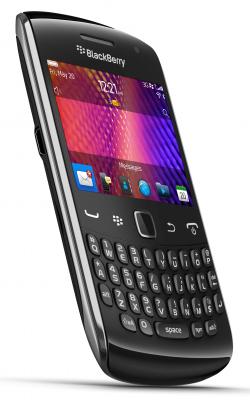RIM Announces New NFC-Enabled BlackBerry

Research in Motion has launched a new Blackberry handset with built-in NFC support, part of its lower-end Curve series. It not yet clear which telcos will introduce NFC services with the phone and when, however.
The phone comes in three related versions, the BlackBerry Curve 9350, 9360, 9370. The main differences are the network standard the models support, either GSM/UMTS or CDMA, or in the case of the 9370, support for both as well as somewhat more internal memory storage. All three models, which RIM considers as entry-level smartphones, run the handset maker’s BlackBerry 7 operating system.
The new Curve models will be available this month in Canada and next month in other countries, according to an announcement today from RIM. The Canada-based handset maker earlier this month confirmed shipping dates for its higher-end NFC-enabled BlackBerry Bold 9900 and 9930 models around the end of this month. RIM is expected to launch at least two more NFC-enabled BlackBerry handsets this year, sources told NFC Times.
U.S. mobile carrier Sprint announced today it would introduce the CDMA-only version of the new Curve, the 9350, Sept. 9 for $79 with a two-year contract. Vodafone in the United Kingdom is also reportedly planning to stock the phone. These two telcos and others are buying the NFC-enabled Bold models, as well, though none have promoted the NFC functionality in the phones, at least not yet.
RIM, in announcing the new Curve models–like its earlier announcements of the Bold models–did not mention the ability of the phones to support payment or other secure applications. Instead it noted NFC’s “ability to pair accessories or read smart poster tags with a simple tap of the smartphone.”
The phones, however, are believed to be able to support payment and other secure applications. They will almost certainly carry an embedded secure chip, which would be made by Infineon Technologies and stacked with the NFC chip. That package is supplied by France-based NFC chip maker Inside Secure.
Research in Motion has plans for the embedded chip, NFC Times has learned. It may be working on a mobile wallet. And most likely it wants the chip to store corporate badge credentials to support enterprise applications. For example, RIM might introduce a physical-access application, which could control entry to corporate offices with a tap of the phone. The chip might store credentials to control network applications, as well.
Among other things, if telcos buying the BlackBerry models do not enable the NFC features when launched, it’s probably because of a lack of business relationships to launch NFC services. And if RIM is planning its own wallet, the telcos probably wouldn’t want to enable that, either.
Sprint is planning to launch the Google Wallet on the Android-based Nexus S 4G phone this fall, a launch supported by Google, Citigroup, MasterCard, First Data and others, but the wallet does not run on BlackBerry phones.
“Sprint does not have anything to share at this time, but we are actively exploring NFC capabilities with others in the mobile commerce ecosystem,” a Sprint spokeswoman told NFC Times.
Other U.S. telcos, such as Verizon Wireless and AT&T, which plan to sell the NFC-enabled Bold, are part of the Isis joint venture, which will not be ready to launch NFC services until the first part of next year, though the Isis-wallet launch could be moved up. Vodafone is not ready to launch NFC services in the United Kingdom.












